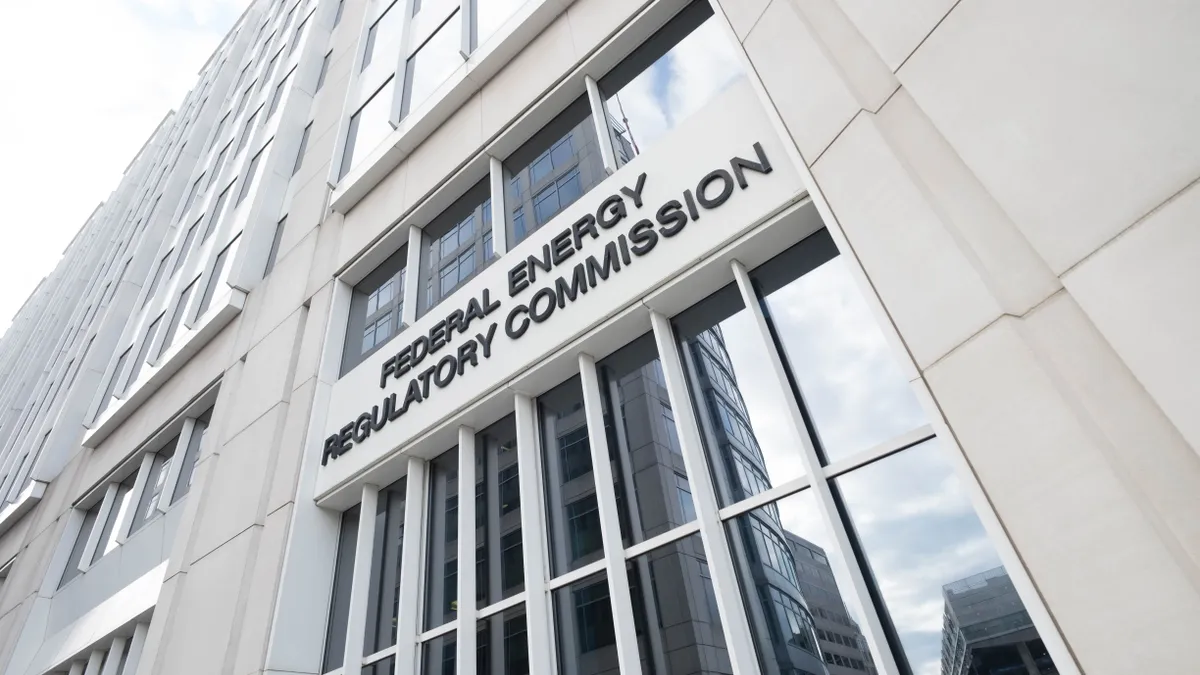Dive Brief:
- The Federal Energy Regulatory Commission approved four separate orders to narrow exemptions of buyer-side mitigation (BSM) market rules in the New York Independent System Operator's (NYISO) capacity zones during Thursday's public meeting, which critics say will stifle the competitiveness of clean energy resources.
- The decisions would make it more difficult for new clean energy projects expected in the state to clear NYISO's capacity auction. Clean energy advocates say bidding into NYISO's capacity market is critical to the financial viability of projects like offshore wind and energy storage.
- NYISO had proposed exemptions for 1,000 MW of renewable energy resources and the New York Public Service Commission and the New York State Energy Research and Development Authority sought to exempt all electric storage resources from the BSM rules, but FERC rejected the proposals. The grid operator is reviewing the order and will have the option to file a rehearing request along with other stakeholders.
Dive Insight:
FERC Chairman Neil Chatterjee insisted that the orders are distinct from other FERC decisions regarding the impact of state subsidies in regional transmission operator markets.
"Today's orders protect the competitiveness of New York ISO's capacity market by addressing the price-distorting actions that could have unintended impacts on the future supply of electricity consumers," Chatterjee said during the meeting.
But critics have likened BSM to the Minimum Offer Price Rule (MOPR) in PJM.
"The one similar theme: All of them go after clean energy policies. They're trying to raise prices and go after clean energy policies and the way they do it is different," Commissioner Richard Glick told Utility Dive. Glick was the only one of the three active commissioners to dissent from each of the four orders.
Senate Minority Leader Chuck Schumer, D-N.Y., had written FERC on Wednesday, asking commissioners not to approve BSM market rules that would undermine the state's climate and clean energy goals.
"FERC has become a wholly-owned GOP subsidiary, doing the bidding of the biggest polluters," he said in a tweet on Thursday after the orders were issued.
"The wholesale markets must now accommodate state policies; not conflict with them," Rich Dewey, President and CEO of NYISO, said in a statement, adding that the grid operator will consider "appropriate next steps."
"Our challenge now is to foster the State's public policies through the competitive electricity markets," Dewey said.
Last summer, New York passed an ambitious decarbonization and renewable energy investment program, requiring 100% clean energy from the utility sector by 2040. State regulators, state energy groups and the grid operator are also looking at ways to implement the statute along with ambitious offshore wind and energy storage goals.
"We remain committed to harmonizing the FERC's jurisdictional obligations while respecting New York State's right to determine the appropriate resource mix within its jurisdiction," he added.
Local environmental groups like the Alliance for Clean Energy NY have already announced plans to appeal the decision. Under the Federal Power Act, stakeholders must file a request for rehearing and cannot litigate FERC decisions until regulators respond to that request.
However, the agency has tolled rehearing requests indefinitely for their market decisions regarding ISO-NE's Competitive Auctions with Sponsored Resources (CASPR) rule and PJM's MOPR. Glick said FERC commissioners cannot discuss either CASPR or MOPR as the two cases have pending rehearing requests.
Some stakeholders that have supported the PJM MOPR and other mechanisms to block the impacts of clean energy subsidies from states voiced similar support for the BSM ruling.
"Any other approach ultimately asks New Yorkers to foot the bill for power generation projects regardless of whether they are delivered on time or on budget, and for propping up outdated, costly plants — when that burden should stay with private operators and investors," Todd Snitchler, president and CEO of the Electric Power Supply Association (EPSA), said in a statement.
While the organization is still reviewing FERC's Thursday orders, EPSA supports approaches like economy-wide carbon pricing as opposed to clean energy subsidies in pursuit of lower emissions and state-based clean energy goals.
"It's high time for action on market-based approaches that many agree are the best and most realistic way to achieve environmental goals," Snitchler said.
Critics of the BSM have accused such subsidy-reducing actions of enabling fossil fuel plants to remain open despite plans for retirements. Within ISO-NE, the 448 MW Merrimack coal plant recently got an extended lease on life by clearing the capacity auction without trading, to get replaced by cleaner resources, in the substitution auction, also referred to as the CASPR secondary auction.
"I think the fact that this old coal plant that barely operates is still in the market and didn't come out through the substitution auction highlights a deficiency in how the system is operating right now," Ari Peskoe, director of the Electricity Law Initiative at Harvard Law School told Utility Dive regarding the ISO-NE auction results.
While PJM has not held an auction under MOPR yet, similar results are expected, blocking clean resources from competing.
CLARIFICATION: This story was updated to include details on CASPR and the coal plant that cleared ISO-NE's capacity auction.














